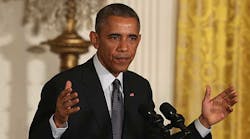WASHINGTON - President Barack Obama on Monday targeted U.S. companies' retained offshore profits with a one-time tax to repair roads and bridges and build a "21st century infrastructure."
The proposed $4 trillion budget for fiscal 2016 aims to raise $238 billion from the 14% levy on income U.S. companies have socked away offshore to avoid paying U.S. taxes.
That would be close to half of the current 35% top rate companies have to pay on profits returned to the United States.
Obama also proposed a minimum 19% tax on companies' future offshore profits, without allowing them to defer the payments.
"The budget closes loopholes that punish businesses investing domestically and reward companies that keep profits abroad," the president said in the budget statement.
The receipts from that will be used "to rebuild our aging infrastructure", he said.
The new proposal would offer "no loopholes or opportunities for deferral" for offshore earnings, the statement said.
U.S. companies have more than $2 trillion in profits stored offshore. General Electric, Apple, Microsoft, Pfizer and Merck each holds tens of billions of dollars outside the country in low- or no-tax jurisdictions.
"The budget closes loopholes that punish businesses investing domestically and reward companies that keep profits abroad." - President Obama
The companies have lobbied for Washington to grant a holiday, or an extremely low rate, on offshore profits in order to bring the money back to the United States.
While the companies say they would invest the repatriated funds, critics say a previous tax holiday 11 years ago saw most of the benefits go to shareholders.
According to a U.S. Senate report in 2011, "rather than producing new jobs or increasing research and development expenditures, the 2004 repatriation tax provision was followed by an increase in dollars spent on stock repurchases and executive compensation."
"In addition, the repatriation tax break created a competitive disadvantage for domestic businesses that chose not to engage in offshore operations or investments, and provided a windfall for multinationals in a few industries without benefitting the U.S. economy as a whole."
Obama said the funds raised in the 14% tax move would be used for a $478 billion, six-year program to upgrade roads, bridges and mass transit around the country.
"Devoting one-time transition revenue to infrastructure investments is both pro-growth... and fiscally responsible," the budget proposal said.
Copyright Agence France-Presse, 2015



